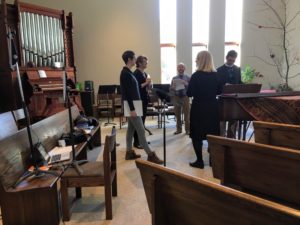 NOTE: Today for the first time, the Good Shepherd congregation did not worship in person. Instead a YouTube link link was created so members could participate in the live stream of worship. The service was also broadcast on the radio at 11:00 am on KWLC 1240am https://www.luther.edu/
NOTE: Today for the first time, the Good Shepherd congregation did not worship in person. Instead a YouTube link link was created so members could participate in the live stream of worship. The service was also broadcast on the radio at 11:00 am on KWLC 1240am https://www.luther.edu/
- The sermon was recorded and posted on Facebook and the website under the “Connect” tab as usual.
- The bulletin for today can be found on the website under the “Connect” tab.
- The Faith5 practice at home or over the phone with family or other congregation members was prepared and shared by Kathryn Thompson.
- Worship was led by Brooke, Jonathon Struve, Kathryn Thompson, Pastor Marion and Pastor Amy.
- Plans are progressing for how we will stay connected as the people of God and care for God’s world in this time. Those will be shared early this week. Please contact the church office if you can help.
Tuesday, March 17
7:00 p.m. – Congregational Council Meeting
Wednesday, March 18
Lenten Service – To be announced
Sunday, March 22 – Fourth Sunday in Lent
9:30 a.m. – Worship with Holy Communion – 11a.m. Broadcast
Information about live streaming of the service will be announced.





